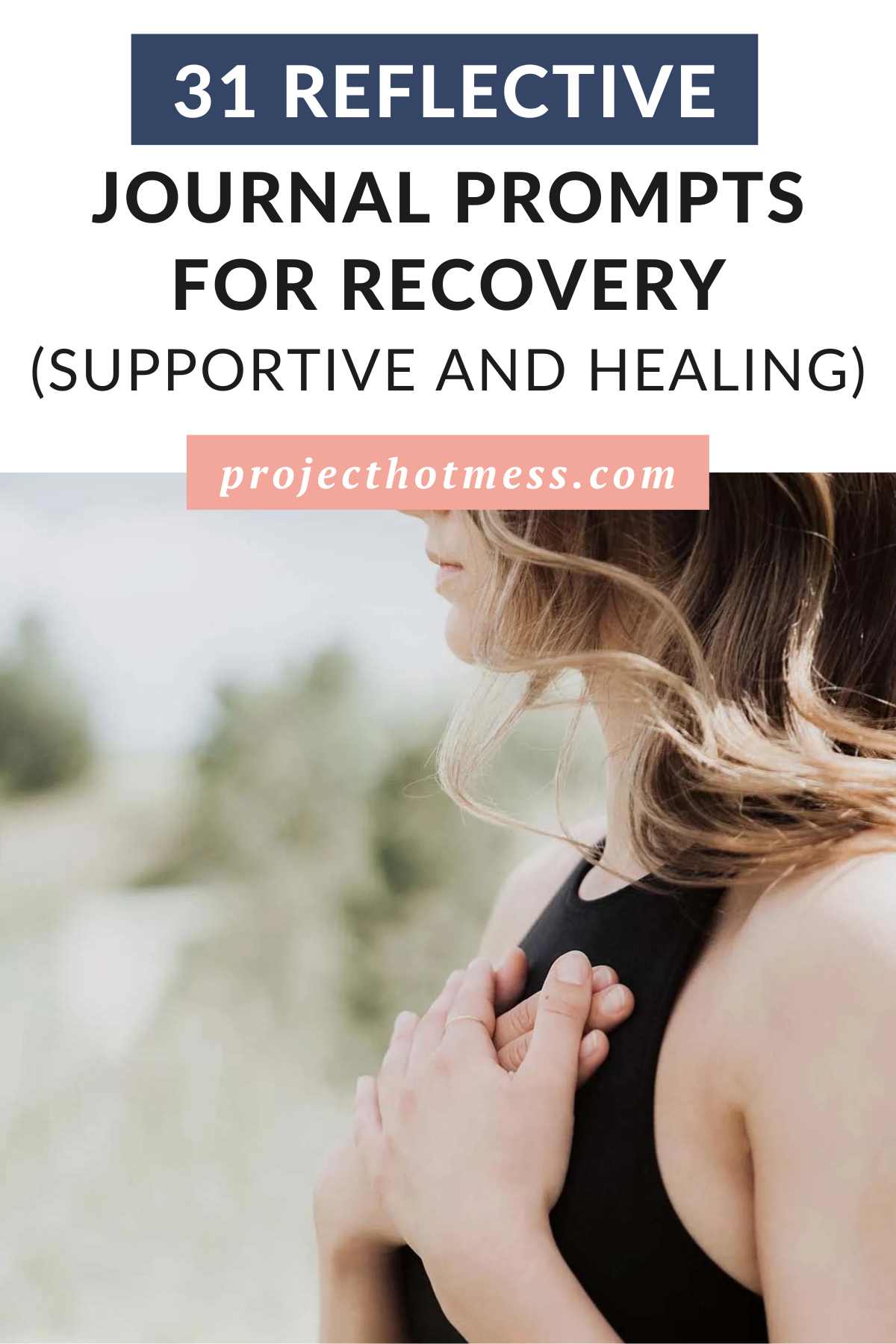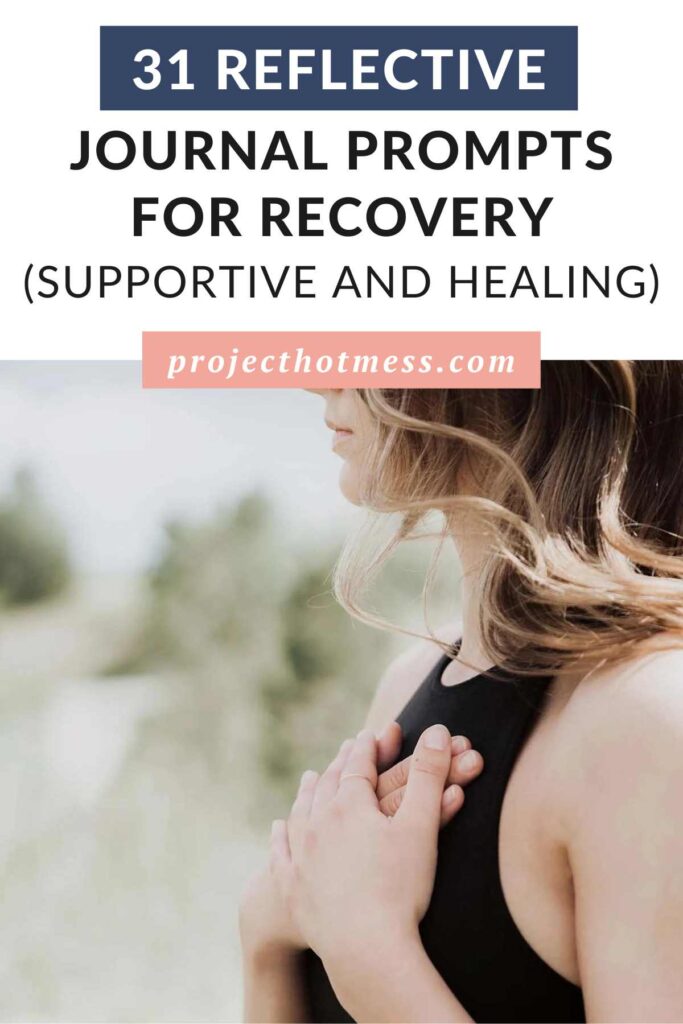31 Reflective Journal Prompts For Recovery (Supportive & Healing)
Journaling is a powerful tool used by many people (and recommended by many professionals) to help you to become more aware of your thoughts, feelings, and behaviors.
When it comes to recovery, journaling, and using specific journal prompts for recovery that are supportive and healing can have a wide range of benefits and can help you feel like you’re on the right path.
Journaling can be helpful in various types of recovery, whether recovering from an eating disorder, alcohol addiction and substance abuse, childhood trauma, or any other traumatic experience.
By using recovery journal prompts as a way to help your journal writing, you can gain a better understanding of yourself, and your mindset, and help you with personal growth.

How Does Journaling Help In Recovery?
Journaling is widely used for emotional healing and is often used as part of addiction treatment and disorder recovery treatment programs.
There are many different ways to journal, whether you sit and write a journal entry, or art therapy as a therapeutic tool (which you can still do with your journal prompts), the most important thing is that you find a way to journal that suits you.
While it’s easy to explain the benefits of journaling, it can be more motivating to understand how a journaling practice can specifically help in recovery.
Here’s how:
Journaling Can Help You Get To Know Yourself Better
Any form of addiction or trauma can be like wearing blinders that keep you from seeing all the other aspects of your life.
Journaling can help you take off those blinders and get in touch with what’s really going on for you.
While many people think they know themselves well, using a daily journal and making journaling part of your regular routine can help you to become more self-aware, and help you to build your confidence and understanding of yourself.
This time of reflection can allow you to see areas of your life that are working well, it can help you to identify trauma triggers and what triggers negative feelings, as well as help you to identify short-term goals and create actionable steps to achieve them.

Journaling Can Help You Process Emotions
Journaling can also provide a much-needed outlet for all the emotions that come up during addiction recovery.
The process of getting sober is bound to stir up a lot of feelings – sadness, anger, frustration, fear, shame, and elation.
It’s important to have a healthy way to express all of those emotions, and journaling can be that outlet.
While it can be tempting to hide from negative thoughts and difficult emotions, facing these thoughts and emotions, and processing them can go a long way to helping in the healing journey.
This can be incredibly powerful in your recovery, especially when you experience a tough day, or a set back, or when you’re feeling like you’re ready to just give up on it all. Journaling can help you to identify what your emotions are, where they are coming from, and how you can process them.
Journaling Can Keep You Accountable
Journaling can help you stay accountable to yourself and your recovery goals.
Every day, you can write down what you did to work on your recovery, no matter how small the steps may seem.
Over time, you’ll be able to look back and see just how far you’ve come – which is bound to be hugely motivating.
If you know that you are going to be journaling at the end of each day, it can start to influence your daily life in a good way, and help you to stay on track in your own recovery.

Why Use Journaling Prompts?
Using journal prompts, or writing prompts, is an effective way to help you get the most out of your journaling process.
If you’ve ever felt the frustration of sitting in front of a blank page wondering what to write, then you know how offputting and disheartening it can be.
And, if you are always wondering what you’re going to write about, then you’re probably not going to look forward to or enjoy the journaling experience, which can really hinder your healing process.
However, if you can take away that ‘what do I write about?’ element, and replace it with journal prompts that are designed to help in the addiction recovery process, then this can certainly help you move along your healing journey a whole lot faster (and with more depth of understanding).

31 Reflective Journal Prompts For Recovery
Using journal prompts as a way of guided journaling is a great way to get started with a journaling practice (or to add some variety to your current practice).
These journaling prompts can make you feel uncomfortable, they can challenge you, and they may bring up emotions that can be difficult to process.
Please ensure your recovery supporters are aware you are journaling and can talk you through the process and how best to approach journaling specifically for you.
Here are 31 reflective journal prompts for recovery that can help you get started:
1 – What was my experience with addiction like?
2 – What were the turning points that led me to seek help?
3 – How has sobriety changed my life?
4 – What are the biggest challenges I’m facing in recovery?
5 – What are my fears and doubts about recovery?
6 – Why do I want to stay sober?
7 – What are the things that trigger my urge to use?
8 – How can I avoid or cope with triggers?
9 – What are the people, places, and things I need to stay away from in order to stay sober?
10 – What are my biggest accomplishments in recovery?

11 – Who or what has been the biggest support for me in recovery?
12 – What have I learned about myself through recovery?
13 – What are the things I’m most proud of about myself?
14 – How has my relationship with myself changed since getting sober?
15 – How has my relationship with others changed since getting sober?
16 – What is forgiveness, and why is it important in recovery?
17 – What is something that makes me smile?
18 – What is something that is hard for you right now?
19 – What is something that has surprised you about recovery?
20 – How does your body feel right now? How do you want it to feel?
21 – What is something you are grateful for?

22 – What is a goal you have for yourself in recovery?
23 – Who or what is your biggest inspiration right now?
24 – What does your ideal future look like?
25 – How can you take care of yourself today?
26 – Write a letter to you now from your future self. What do you want the future version of you to say?
27 – What is something that gives you a sense of peace?
28 – What are some things you can do to ease your anger?
29 – How can you show yourself compassion today?
30 – What is a self-care activity you enjoy? How often can you make that happen?
31 – What are three things you can do to make your recovery journey more manageable or even enjoyable?

Tips When Journaling For Recovery
There are no hard and fast rules when it comes to journaling, and there’s no right or wrong way, but there are definitely some things that can make the process more effective (and less daunting).
Here are a few tips for journaling during addiction recovery:
1 – Prioritize Your Journaling Time
Set aside time each day (or as often as you can) to write in your journal.
It doesn’t have to be a long chunk of time, even just 10-15 minutes can be enough.
But try to make it a consistent time so that journaling becomes part of your daily routine.
If you prefer to journal of a morning and kick start your day with your journaling practice, then go for it. If you’d rather wait until the end of the day and reflect, then that’s totally fine too.
Find what works for you, and then make it consistent.
2 – Find A Comfortable Place To Journal
Choose a place where you feel comfortable and relaxed.
It could be a spot in your home, outside in nature, or even at your local coffee shop.
The main thing is that you feel good about the space you’re journaling in and that it’s somewhere you can focus without distractions.
3 – Don’t Restrict Yourself… And Don’t Force It
Write for as long as you want, but don’t force yourself to write more than you feel comfortable with.
If you’re struggling to write for 10 minutes, then don’t force it. If you can only get two words on the page, that’s okay. If you end up writing a short novel, that’s okay too.
The effects of journaling extend beyond the words you put on the page.
And don’t restrict yourself to just writing either.
If you feel like drawing or doodling, then go for it.
Your journal is for you, and however you want to express yourself is totally fine.

4 – Be Honest With Yourself
This is probably the most important tip of all.
Your journal is for you, and it’s a safe space for you to be honest with yourself.
That means being open and honest about the good, the bad, and the ugly.
No one else has to see your journal (unless you want them to), so you can write whatever you want.
And if you’re worried about what you might write, don’t be. You might even find after some time that the complete honesty that comes with journaling is therapeutic and something you look forward to.
5 – Don’t Edit Yourself
Your journal is a place for you to be yourself, and that means not editing or censoring your thoughts and feelings.
Let it all out, and don’t worry about whether it makes sense or not.
You can always go back and edit later if you want to, but for now, just write (or draw, or doodle) whatever comes into your head.
Final Thoughts
Journaling is a powerful tool that can be beneficial for anyone, but it can be especially helpful during recovery.
If you’re struggling to cope with withdrawal symptoms, manage your triggers, or just want a safe space to express yourself, then give journaling a try.
And if you’re not sure where to start, then why not try one of the prompts above?








